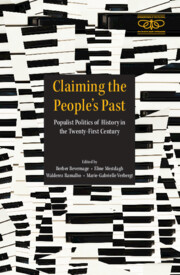Book contents
15 - Does Populism Challenge the Expertise of Academic Historians?
Published online by Cambridge University Press: 15 May 2024
Summary
Introduction
This chapter explores the question posed in its title: ‘Does populism challenge the expertise of academic historians?’1 It is well known that populists (or, to be more precise, people who have often been called populists, since at this point I have not suggested a definition of this term) make assertions about the pasts of their own countries and often about historical pasts more generally. In doing so, they are at least in part making knowledge claims about the past and not simply expressing feelings of attachment or aversion. To the extent that their claims have a cognitive content, one might think that this would put populists on a collision course with the narratives that academic historians produce. Moreover, it is well known that ‘the rise of populism in the West has led to attacks on scientific expertise’ (Collins et al. 2020: 1). One might think that this anti-scientific tendency, together with populists’ interest in making claims about the past, would lead them to challenge not just the narratives but also the expertise of academic historians.
But reality turned out to be quite different from what I originally supposed it would be. Although historians are interested in populists, populists rarely show interest in the academic work produced by historians. Even less are populists interested in, or even aware of, the expertise that academic historians claim, by which I mean the toolkit of methods and approaches by which academic historians formulate questions, search for and interpret evidence, evaluate that evidence, and construct accounts of the past well enough grounded to withstand the criticisms offered by their professional colleagues. The fact is, academic historians doing academic work rarely come into the range of view of populists. Even academic historians who step into an activist role and attempt to draw lessons for the present from their study of the past seem to have been barely noticed by populists. I think, for example, of Timothy Snyder's little book On Tyranny (Snyder 2017), written in the wake of the election in 2016 and Donald Trump's election to the presidency of the United States of America (USA), which circulated widely among academics and some other readers, but raised hardly a peep from populists.
- Type
- Chapter
- Information
- Claiming the People's PastPopulist Politics of History in the Twenty-First Century, pp. 288 - 305Publisher: Cambridge University PressPrint publication year: 2024

